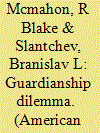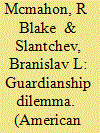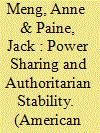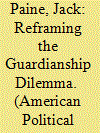| Srl | Item |
| 1 |
ID:
140173


|
|
|
|
|
| Summary/Abstract |
Armed forces strong enough to protect the state also pose a threat to the state. We develop a model that distills this “Guardianship Dilemma” to its barest essentials, and show that the seemingly ironclad logic underlying our existing understanding of civil-military relations is flawed. Militaries contemplating disloyalty must worry about both successfully overthrowing the government and defeating the state’s opponent. This twin challenge induces loyalty as the state faces increasingly strong external threats, and can be managed effectively by rulers using a number of policy levers. Disloyalty can still occur when political and military elites hold divergent beliefs about the threat environment facing the state, since militaries will sometimes have less incentive to remain loyal than the ruler suspects. Consequently, it is not the need to respond to external threats that raises the risk of disloyalty—as conventional wisdom suggests—but rather uncertainty about the severity of these threats.
|
|
|
|
|
|
|
|
|
|
|
|
|
|
|
|
| 2 |
ID:
140818


|
|
|
| 3 |
ID:
187658


|
|
|
|
|
| Summary/Abstract |
Regimes founded in rebellion are, typically, extremely durable. We propose that this stability is founded upon peaceful power sharing between the rebel regime leader and military elites. Amid long and intense fighting, rebel leaders must delegate control to top military commanders because doing so helps them to win battles. After seizing power, power-sharing deals between former combatants are highly credible due to their history of interactions, which mitigates the guardianship dilemma. Elsewhere, a persistent internal security dilemma often undermines power-sharing deals. Using originally collected data on African regimes from 1960 to 2017, we establish that rebel regimes break down seldomly compared with other authoritarian regimes and they experience fewer coups. Regarding the mechanism, rebel regimes more frequently share power with military elites by appointing a Minister of Defense. These Ministers are typically high-ranking members of the rebellion, which reflects the regime’s replacement of the state military with their own.
|
|
|
|
|
|
|
|
|
|
|
|
|
|
|
|
| 4 |
ID:
187671


|
|
|
|
|
| Summary/Abstract |
Dictators confront a guardianship dilemma: military agents are needed to defeat mass outsider movements, but these agents can overthrow the ruler from within. In existing theories, rulers prioritize coup-proofing measures unless they anticipate strong outsider threats. Then dictators prioritize military competence. I reframe the guardianship dilemma around the central idea that militaries can choose between dual disloyalty options. In addition to staging a coup, militaries can defect by not fending off popular uprisings or rebellions. Dictators fear competent militaries not primarily because of their coup threat but instead because they often survive intact following a regime transition. Low motivation for competent militaries to save the ruler undermines their rationale of guarding against outsider threats, even if they pose a low coup threat. Consequently, rulers prioritize competence under narrow circumstances. Only radically oriented outsider movements that pose an existential threat to all regime elites induce loyalty from a competent military.
|
|
|
|
|
|
|
|
|
|
|
|
|
|
|
|